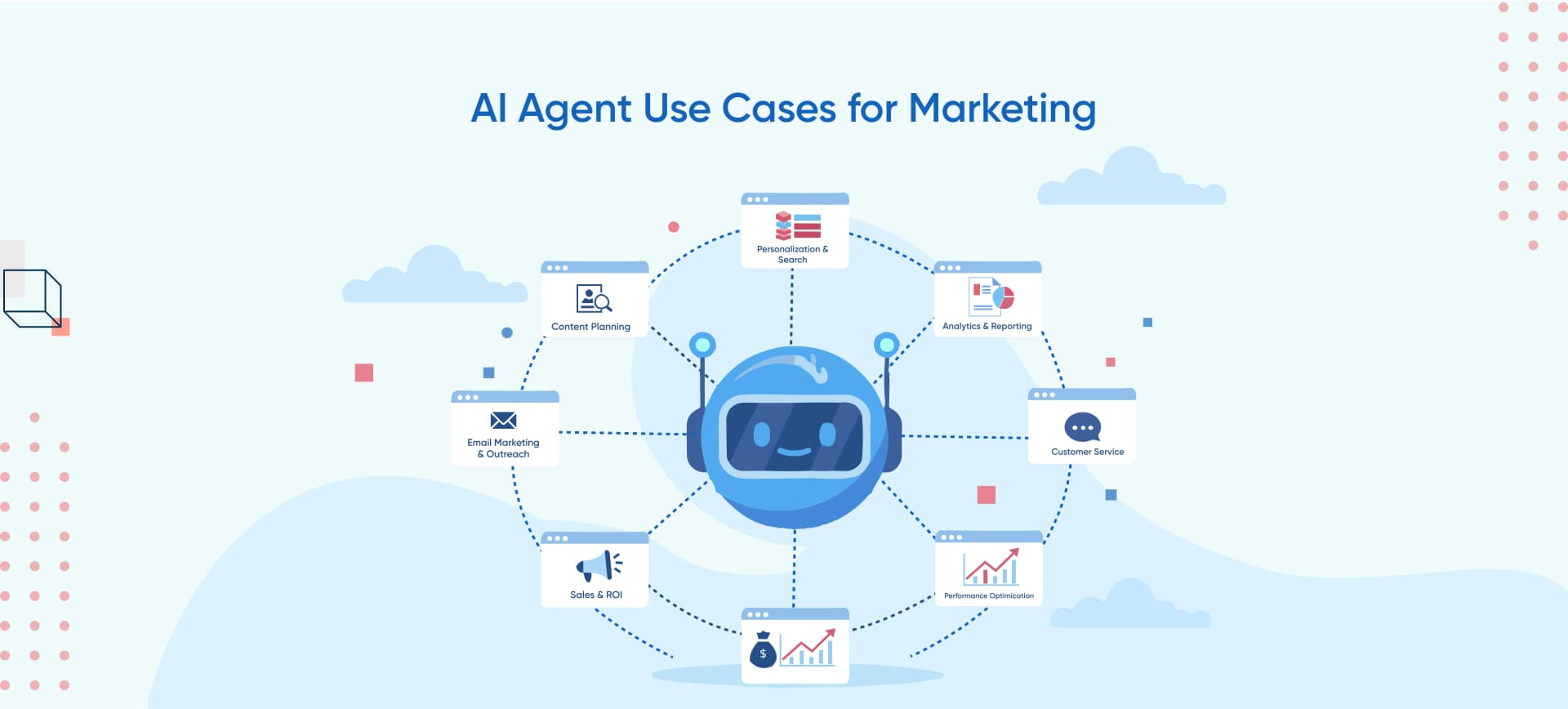If a teammate quietly optimized every ad, email, and page while you slept, how much would you ship?
Imagine waking up to fresh tests running, budgets rebalanced, and a clear list of next moves. No more pings, no late-night dashboards, this is the promise of AI agent use cases for marketing.
AI agents are always-on teammates that watch your data, decide the next best action, and execute across your stack. Instead of queuing tasks, agents learn from outcomes, refine targeting in mid-flight, and maintain consistent journeys across channels.
You focus on strategy and creativity while they handle the grind, the handoffs, and the micro-decisions that compound into results.
Ready to see where they drive quick, defensible wins in your setup?
What are AI agents in marketing?
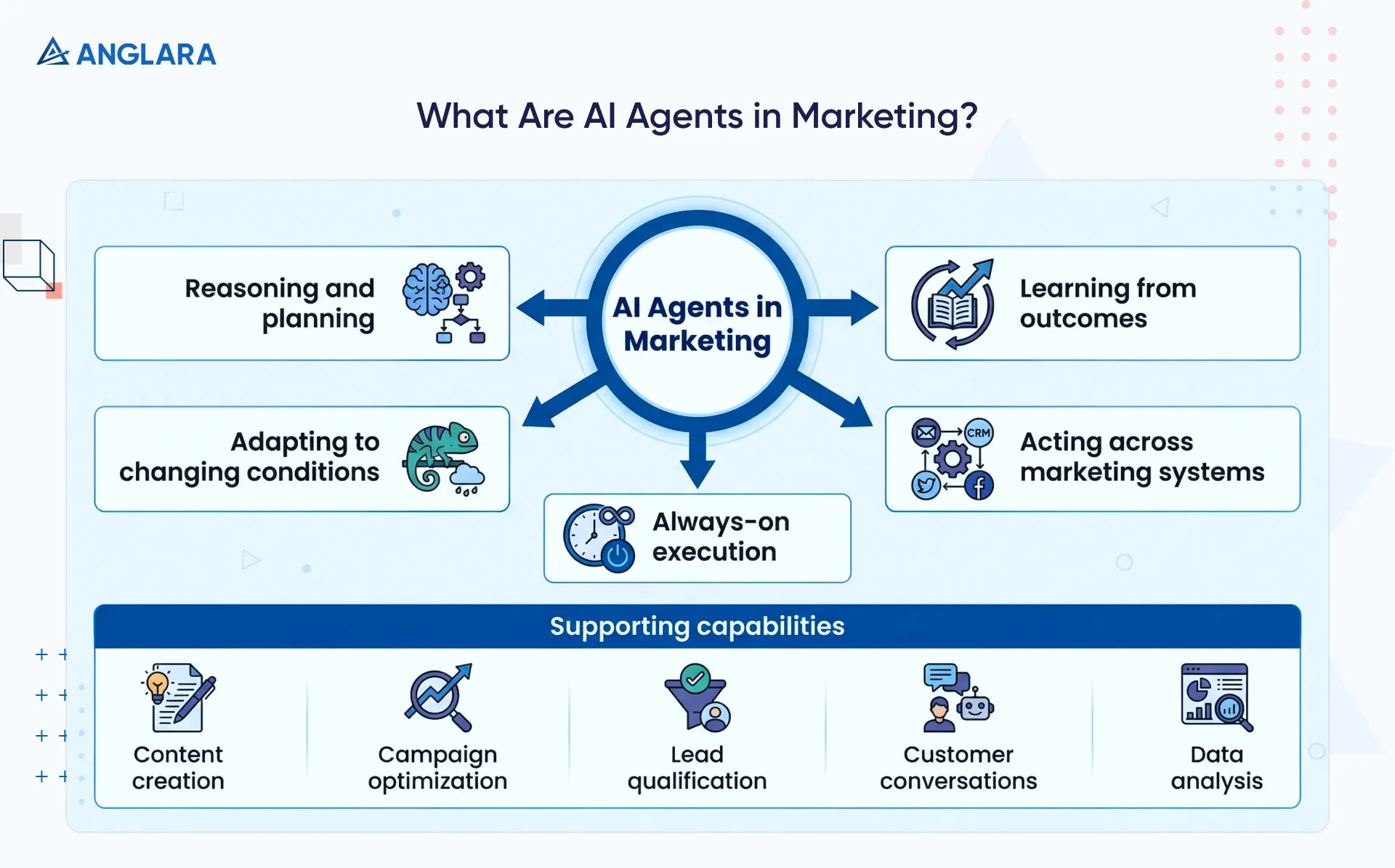
AI agents are artificial intelligence (AI) software systems that handle marketing tasks by reasoning, planning, and adapting to changing conditions. Unlike traditional automation, which follows rigid rules, AI agents utilize machine learning (ML), natural language processing (NLP), and predictive analytics to understand context, make informed decisions, and coordinate across multiple systems.
Think of an AI agent as a marketing specialist available 24/7, who can handle:
- content creation
- campaign optimization
- lead qualification
- customer conversations
- data analysis
All this while learning what works best for your business.
These systems don't just follow instructions; they analyze your marketing data, spot patterns humans miss, predict outcomes, and suggest adjustments before problems arise.
AI agent use cases for marketing
You want outcomes, not another tool to babysit. Think of AI agents as always‑on teammates that watch your data, decide the next best move, and act across your stack without waiting for a task list.
Here are seven AI agent use cases for marketing where they deliver fast wins.
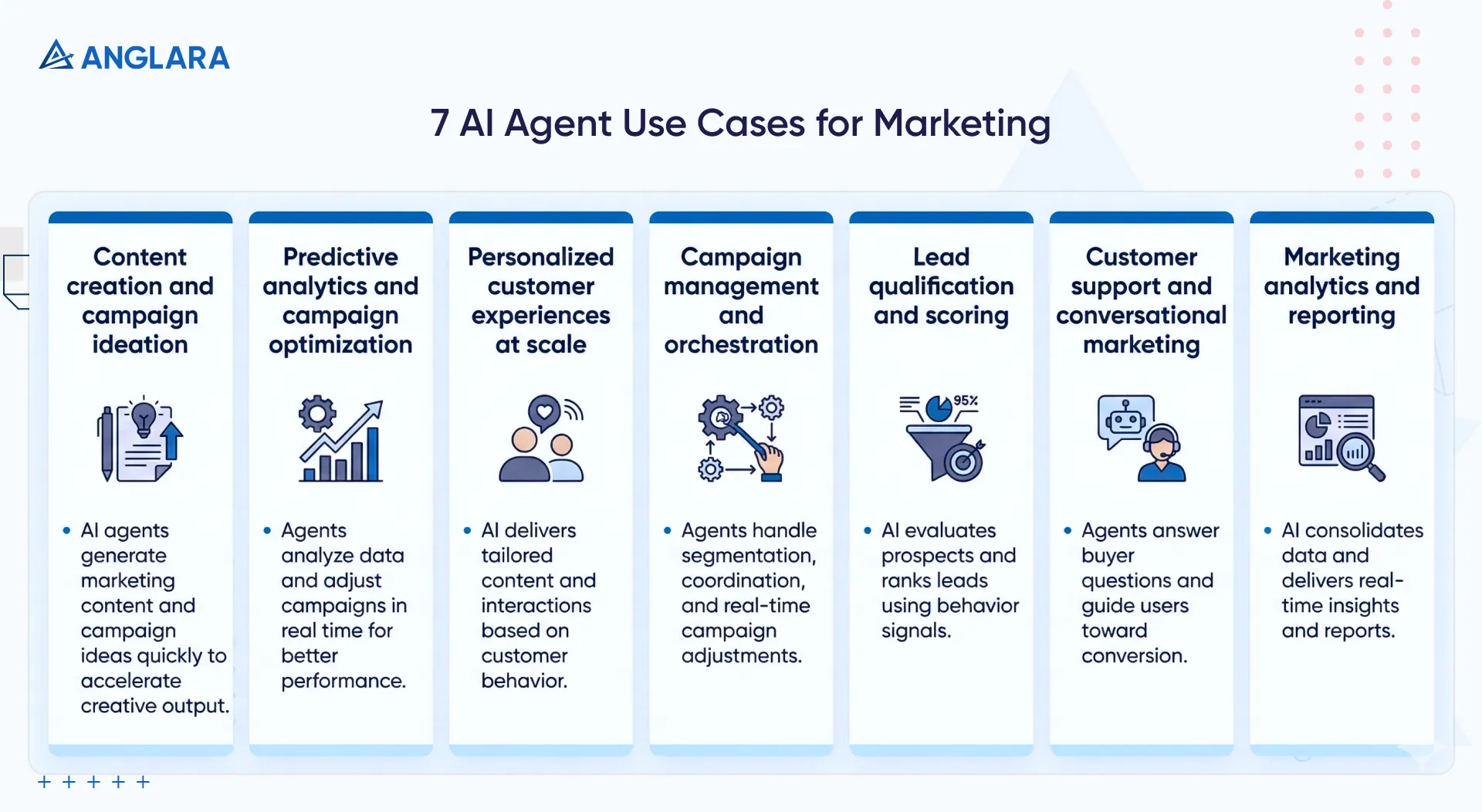
Use case 1: Content creation and campaign ideation
You know how you put your heart into creating a content strategy and then waste hours (sometimes even days) on a single blog to completion? Or ideas don’t come to you, and that ad creative feels like it never hits the mark?
Now, with AI agents, you can create blog posts, social media content, email copy, ad creatives, or even video scripts in just minutes, not hours or days. The agent pulls data from your past campaigns to understand what resonates with each segment, then generates multiple content variations in seconds, each tailored to different channels and buyer personas.
Now, all you have to do is provide a campaign objective, target audience, and key messaging points, and the agent generates content. Then your team only needs to review, edit, and approve, rather than starting from scratch.
Plus, the agent tracks performance and automatically refreshes underperforming content.
Use case 2: Predictive analytics and campaign optimization
Your marketing campaigns start strong, but performance dips. What do you do? Scramble to rebalance budgets, tweak targeting, or figure out what’s off in Google Ads or Meta?
All of that feels like chasing smoke if the data’s scattered everywhere.
However, if you let AI agents monitor your live campaigns, they can manage all channels in real-time and optimize to deliver the highest ROI.
The agent ingests data from Google Ads, Meta, email platforms, and your analytics dashboard, and then compares the current situation against your historical performance. It identifies early signs of underperformance and automatically adjusts budgets, bids, and targeting to keep your campaigns on track. It will also pause what’s not working and increase focus on what is.
And trust us, it gets better with time, as AI agents continuously learn and refine their predictions with the arrival of new data.
Use case 3: Personalized customer experiences at scale
Ever wished to deliver each customer interaction so that it felt like it was crafted just for them? That’s exactly what AI agents make possible.
They analyze each customer’s behavior, preferences, and journey stage to deliver personalized content, product suggestions, and offers in real time. Instead of one-size-fits-all messages, every touchpoint, such as emails, ads, and website content, adapts automatically to the person on the other side.
The agent continuously learns from every click, view, and purchase, refining what to show, when to send it, and how to say it. Over time, your engagement grows stronger while the experience feels effortless for both you and your customers.
Use case 4: Marketing campaign management and orchestration
Does campaign management eat up your team’s entire calendar with that endless segmentation, asset reviews, and multi-channel coordination? All that should go into strategy, not setup.
Now, AI agents can run entire campaigns end-to-end for you. You set the goal and context, and the agent handles the rest, including:
- Segmenting audiences
- Creating tailored journey flows
- Generating assets
- Coordinating across channels
- Launching with built-in adaptability
Once live, it tracks performance, automatically adjusts timing or messaging, and continues to optimize in real-time.
When the campaign ends, you get a clear breakdown of what worked, what didn’t, and where to go next — all without digging through dashboards or spreadsheets.
With this, campaigns that once took months come together in days, faster, smarter, and always in sync with your audience.
Use case 5: Lead qualification and scoring
What if your team never had to guess which leads to chase first?
AI agents can instantly evaluate every prospect using behavior signals, engagement patterns, and fit criteria to surface the ones most likely to convert. They pull data from your CRM, website analytics, email, and ad platforms to learn from past conversions to understand which signals truly matter for your business.
New leads are automatically scored and routed to the next appropriate step. As behaviors change, scores update in real time, keeping your team focused on high-intent prospects while the agent nurtures the rest through personalized outreach.
The result?
A smarter, faster qualification process where your sales team spends time only where it counts.
Use case 6: Customer support and conversational marketing
Say a visitor lands on your site from an ad or email, interested but not fully convinced. They ask a question in chat and get an instant, helpful reply that removes the last bit of friction.
What happens? They book a demo, request a quote, or get a tailored report sent to their inbox for a sales follow‑up.
Now, that’s what an AI agent for conversion support can do. It answers buying questions in real-time, handles objections, and guides next steps, such as booking a SaaS demo, scheduling a call, or generating a curated mini-report for that user.
Trained on your FAQs, product data, pricing rules, and case studies, the agent understands intent, personalizes recommendations, and captures context-rich details before handing off. CRM fields are auto-filled, the report is emailed, and your rep gets a clean brief to close the loop.
Every interaction makes the agent sharper. Visitors get fast, confident answers. You capture intent, reduce drop‑offs, and keep your sales team focused on the conversations that move deals forward.
Use case 7: Marketing analytics and reporting
No more waiting for end-of-week reports or hours spent pulling numbers. AI agents now handle marketing analytics from end to end, aggregating data from every channel, finding trends, and surfacing insights that actually drive action.
The agent connects to your analytics tools, ad platforms, and CRMs, analyzes patterns, and flags opportunities or risks the moment they appear. Predictive models estimate where results are heading and suggest exactly what to do next.
Reports are generated automatically, updated in real-time, and tailored for each stakeholder, so everyone sees what matters most without having to dig for answers.
You get instant clarity, actionable insights, and time back to focus on strategy.
Benefits of implementing AI agents in your marketing strategy
Now that you’ve got seven solid use cases for marketing, let us draw out it’s clear benefits:
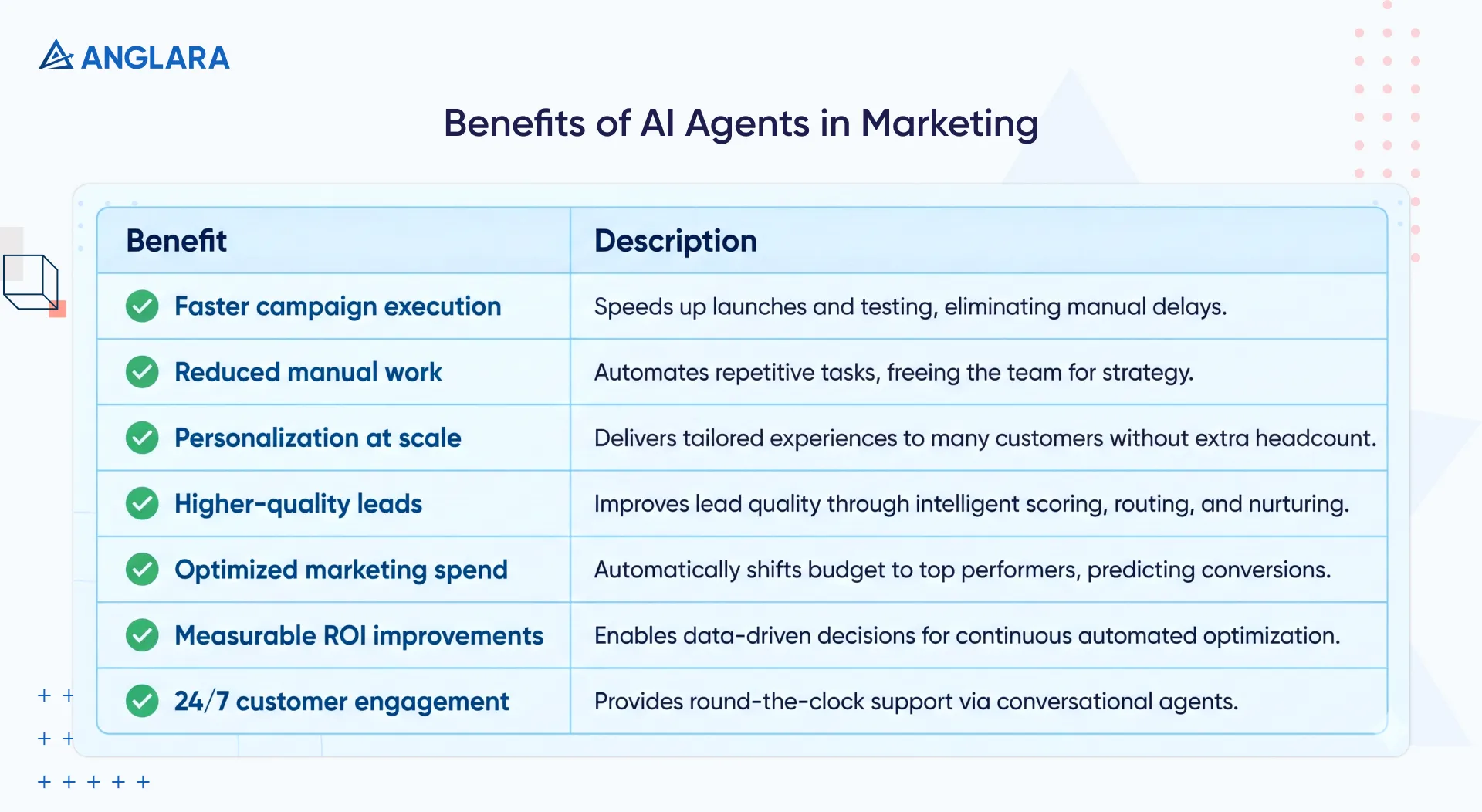
- Faster campaign execution: Accelerate from weeks to days or hours, compressing time to market and enabling rapid testing.
- Reduced manual work: Free your team from content creation, campaign setup, and reporting tasks, allowing them to focus on strategy and creativity.
- Personalization at scale: Deliver unique experiences to millions of customers simultaneously without proportional team growth.
- Higher-quality leads: Enhance lead quality and conversion rates by leveraging intelligent scoring, routing, and automated nurturing based on actual behavioral signals.
- Optimized marketing spend: Automatically reallocate budget to top-performing channels and adjust bids based on predicted conversion likelihood.
- Measurable ROI improvements: Drive data-driven decisions and continuous optimization that adapts faster than human teams can manage.
- 24/7 customer engagement: Enable round-the-clock support through conversational agents that respond instantly and improve based on every interaction.
Industry-specific applications of marketing AI agents
You’ve seen AI agent use cases for marketing in theory. See how these businesses use them in real life:
E-commerce
Sephora has millions of customers across digital channels, but they struggled with personalizing their experiences on each touchpoint without dramatically increasing operational costs.
So, what did they do?
They implemented an AI-driven recommendation engine combining collaborative filtering, content-based filtering, and deep learning. To simplify, the system analyzed customer browsing history, purchase data, quiz results, and product metadata to deliver personalized suggestions. Their Virtual Artist tool utilizes AR to enable customers to try on makeup virtually. The agent even collects preference data from it to inform its recommendations.
As a result, they achieved a 25% increase in average order value, a 30% reduction in returns, and customers who used recommendations were 3.2 times more likely to complete a purchase.
Their AI chatbot resolved 75% of inquiries without human help and saved 20% on support costs.
Travel
Expedia handles a high volume of customer service conversations, averaging 143 million annual interactions across multiple languages and time zones.
Now, that’s hard.
So, to manage all these interactions, they launched an AI travel assistant integrated into messaging platforms.
The agent can build personalized itineraries, answer questions, and deliver real-time updates on delays or weather while pulling data from external sources to tailor recommendations.
As a result, the AI assistant resolves 50% of traveler requests without human intervention. Customer satisfaction ratings from self-serve users are twice as high as those who called support.
SaaS
We all know HubSpot uses AI and marketing automation.
They utilized AI agents to scale personalized onboarding and marketing for thousands of customers without proportionally expanding their team. The AI agents took into consideration industry, company size, and usage patterns to streamline personalization.
During setup, agents identify the most relevant features and prioritize them in tutorials and guides to ensure a seamless experience. Personalized emails guide users through early milestones, while chatbots provide real-time answers to questions. Additionally, the AI-driven analytics segment customers into cohorts, triggering the delivery of targeted support materials for each group.
What was the result? HubSpot's AI tools generated a 99% increase in inbound leads over six months and a 143% rise in web traffic over the course of a year.
BFSI (Banking, Financial Services, and Insurance)
Capital One wanted to deliver personalized financial experiences to over 100 million customers while maintaining security and regulatory compliance. So, they built a custom AI system using their vast data repositories to power personalization engines that deliver relevant product recommendations, detect fraud, support the customer service team, personalize interactions, and provide valuable insights.
Their AI assistant, Eno, proactively alerts customers to the end of free trial periods, monitors for unexpected increases in recurring bills, and explains the reasons for card declines.
On the security side, Capital One’s real-time fraud and AML platform utilizes advanced algorithms, including graph networks over massive structured and unstructured data streams, to detect suspicious patterns instantly, reduce false positives, and automate triage, allowing analysts to focus on complex threats. It’s reported to have a 50% faster incident resolution cycle.
Lastly, Capital One's Chat Concierge increased customer satisfaction by 55% while reducing call center inquiries. Their AI-driven spending insights help customers manage their finances efficiently, improving retention and conversion rates for cross-sell opportunities.
Real estate
Redfin provides real estate brokerage services in the United States and Canada. It aimed to enhance engagement and lead conversion. They needed a technology to:
- Answer listing questions instantly
- Qualify high-intent buyers after hours
- Route ready-to-tour prospects to agents without delay.
So, they built an in-app AI virtual assistant, “Ask Redfin,” that answers property questions, checks touring availability, pulls local market insights, maintains conversation context, and hands off qualified inquiries to the right agent. It also re-engages users with timely prompts and push notifications.
Ask Redfin users became the most engaged cohort in the real estate market, with 93% returning within a week and exhibiting near-daily usage. The assistant accelerated agent introductions within days, reducing response times and enhancing conversion opportunities.
Our AI agent implementation plan
Anglara provides comprehensive AI business consultation for end-to-end AI agent implementation. Our approach is structured, compliance-first, and built to reduce risk while accelerating time-to-value.
Our 12-week implementation timeline
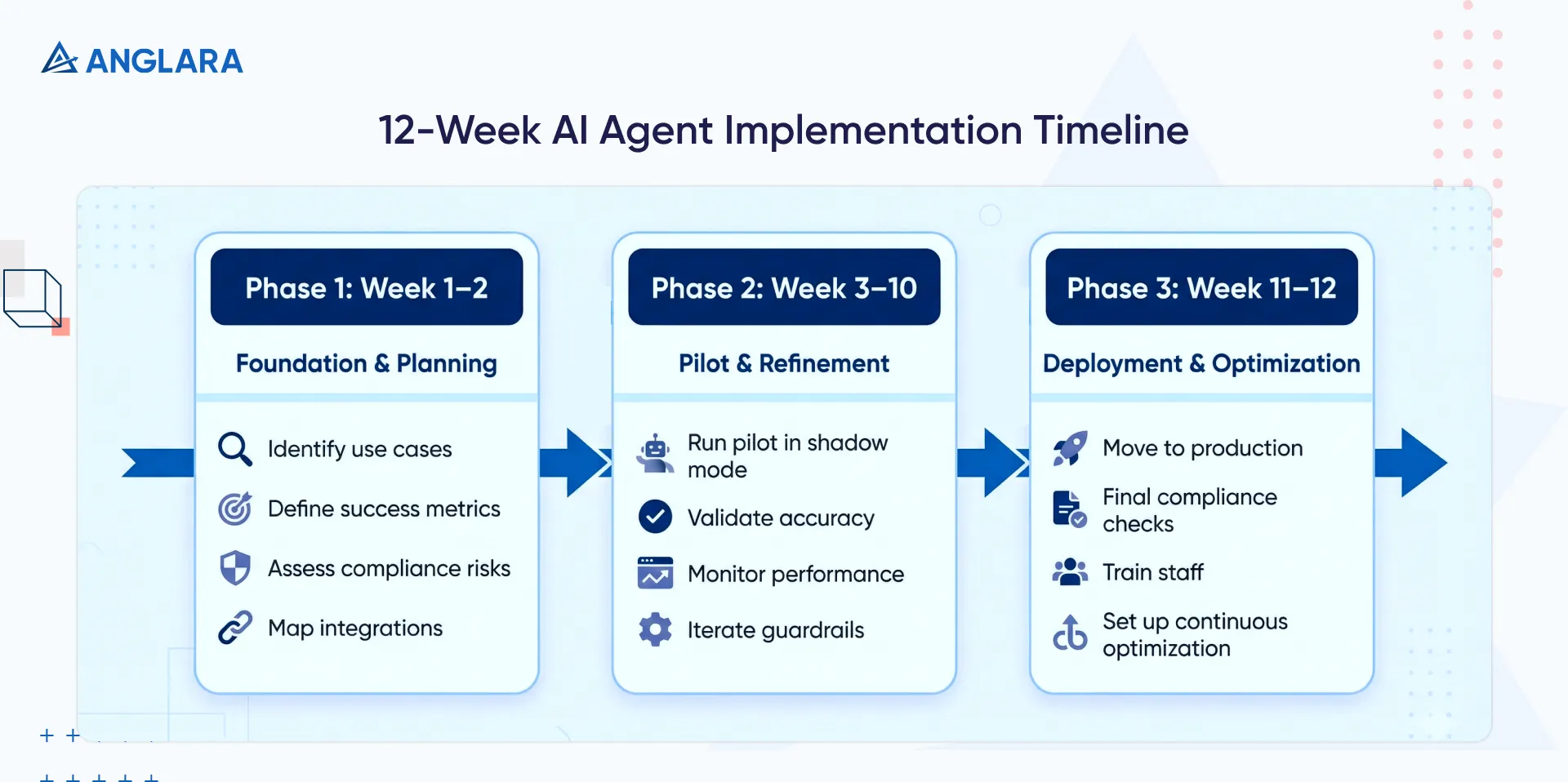
- Week 1–2: Pinpoint high-impact use cases, define success targets, assess compliance risks, and map all integrations. Establish baselines for conversion, CAC, cycle time, and support metrics to quantify uplift.
- Week 3–10: Run a pilot in “shadow mode,” validate agent accuracy, capture feedback, and monitor results against key metrics. Stand up audit trails and human override. Iterate instructions and guardrails weekly.
- Week 11–12: Move to production, roll out stepwise, finalize compliance checks, train staff, and set up continuous optimization. Ship playbooks, dashboards, and an ROI tracker for ongoing governance.
Not sure where to begin? Book a free 30‑minute consultation to clarify your first use case, the data you’ll need, and a safe path to measurable ROI.
Frequently asked questions
How can AI be used for marketing?
AI can smartly automate repetitive, tedious, and time-consuming tasks, allowing your team to focus on strategy. The agents handle the execution and analysis aspects, including:
- Content generation
- Personalizing journeys
- Scoring and routing leads
- Optimizing bids and budgets in real-time
- Turning raw data into actionable insights
It can also power chat and email assistants, run multivariate tests, forecast performance, and orchestrate cross‑channel campaigns.
Can we as a marketing services provider use these AI agents for our clients?
Yes. Agencies can deploy AI agents across client accounts to standardize workflows, scale personalization, and maintain always-on optimization without adding headcount. Typical plays include content ops, predictive budget shifts, lead scoring, journey orchestration, and auto‑reporting. Want a pilot blueprint? Book a 30‑minute consultation.
Do AI agents actually help save cost in marketing?
Yes. AI agents reduce costs by eliminating repetitive work, reducing handoffs, and minimizing rework. They keep campaigns optimized without constant human intervention, so fewer hours are spent on reporting, bidding, and QA. Teams redirect time to strategy and creativity while agents handle execution at scale, minimizing vendor sprawl and avoidable media waste.
What is the price range to implement AI agents in marketing?
Pricing depends on the scope, data readiness, and the depth of integration. A lightweight assistant tackling a single workflow lands very differently than a multi‑agent program tied into your CRM, ads, analytics, and governance. If you’d like to map your options and timelines and get a project estimate, get in touch with our experts.
Can AI agents replace marketers?
No. Agents are great at execution, analysis, and coordination, but they don’t set brand strategy, craft narrative, or navigate nuance with stakeholders. The winning model is a hybrid approach, where marketers define positioning, creative direction, ethics, and guardrails, while agents handle the repetitive, data-heavy work and keep experiments running.



